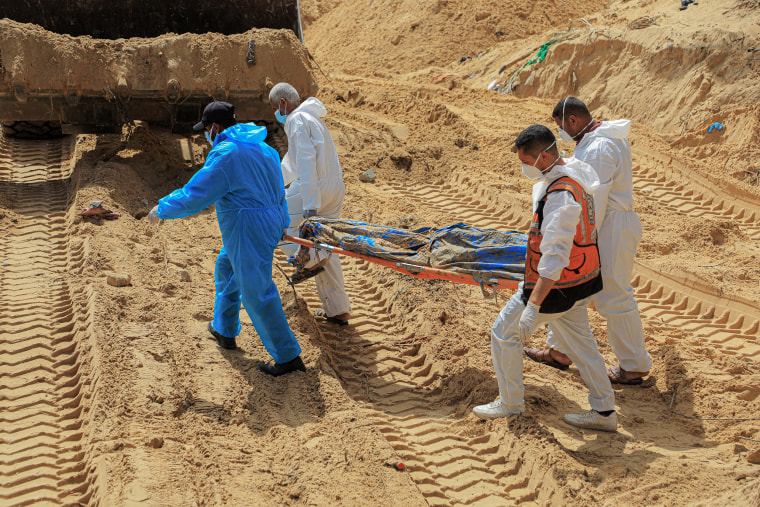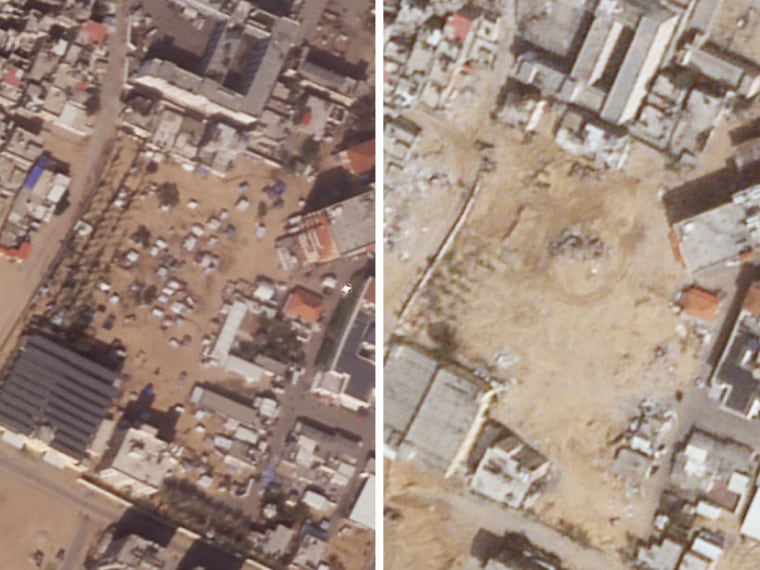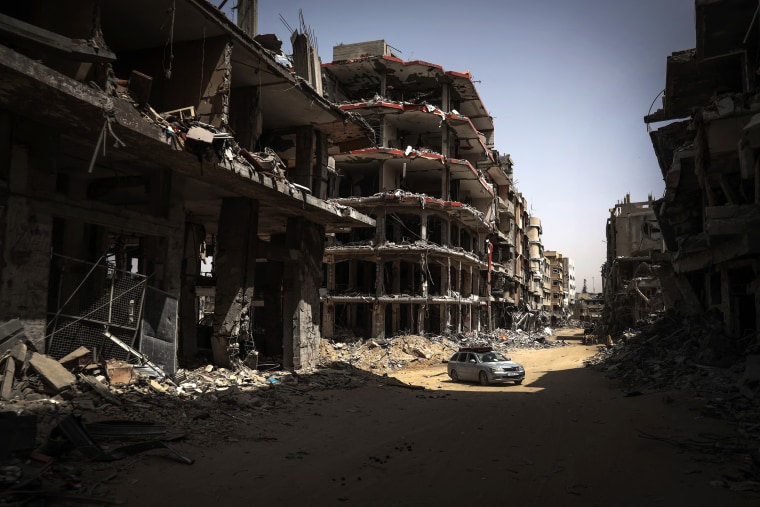At mass graves in southern Gaza’s Nasser Hospital, Palestinian authorities say they are uncovering bodies that bear signs of having been shot in the head, their hands bound by zip ties, stripped of their clothes, or buried in hospital gowns with tubes or needles still in their skin. Among the dead are women and children.
The remains found in the mass graves have raised questions about the circumstances surrounding their deaths during the months of intense fighting in and around Nasser Hospital. Israel denies wrongdoing but acknowledges exhuming bodies that had already been buried, then reburying them, in its search for hostages taken captive into Gaza during Hamas’ Oct. 7 attacks.
John Kirby, spokesperson for the National Security Council, on Thursday called the reports from Nasser Hospital “deeply disturbing,” adding that “we’d like to see this investigated.” Kirby said the White House was in dialogue with Israeli counterparts.
“We want answers,” national security adviser Jake Sullivan told reporters during a news briefing Wednesday. “We want to see this thoroughly and transparently investigated.”
In a statement on Tuesday, the U.N. high commissioner for human rights echoed calls for an investigation, saying the reports from Nasser Hospital prompted “renewed concerns about possible war crimes.”

“Hospitals are entitled to very special protection under international humanitarian law. And the intentional killing of civilians, detainees, and others who are hors de combat is a war crime,” said Volker Türk, the U.N.’s human rights chief, using a term that refers to injured combatants no longer taking part in hostilities.
According to Gaza’s Civil Defense, the government agency that manages emergency services and rescue in the Hamas-run enclave, more than 390 bodies have been found at three mass grave sites at Nasser Hospital in Khan Younis as of Friday, following a seven-day search and recovery operation. At least 165 have been identified, with about 10 of them with their hands bound, said Dr. Muhammad Al-Mughair, head of evidence at Civil Defense, though he did not specify how many of the dead had bullet wounds to the head. He later told NBC News that the bodies of 78 children have been found in the graves.
On Thursday, the Israeli military issued a statement denying it had buried any bodies on the hospital’s grounds. However, it said its troops “inspected” remains buried at the facility to ensure that hostages taken captive into Gaza were not among the dead. It said the remains were “returned to their place” after they were examined.

The IDF did not say exactly when remains were examined at the site, but noted that some 200 people at the facility were apprehended during its raid of the hospital in February. It said medicines intended for Israeli hostages were also found at the site during the raid, which it previously said had ended by Feb. 25. NBC News was not able to independently verify its claims.
Türk underlined that investigations into any deaths at the hospitals should be independent and international, rather than Israeli, “given the prevailing climate of impunity.”
There had been intense fighting around Nasser Hospital since January, when thousands of people were trapped inside, including hundreds of patients. Israeli forces conducted a sweeping raid of the hospital in February and withdrew ground forces from Khan Younis in early April, allowing Palestinian recovery teams to begin searching through the destruction.
It is unclear when the people buried in the graves died, but photos provided by Civil Defense show bodies in different states of decomposition, suggesting that burials took place at different times. An NBC News camera crew filmed families burying loved ones on the grounds of Nasser Hospital as far back as late January.
Palestinian authorities say the Israeli military exhumed existing graves at Nasser Hospital and dug new ones, adding that some of the bodies found in the newer graves were buried in black or blue nylon bags used by the IDF, rather than the customary white bags and shrouds used in Gaza. Palestinian families returning to the site say they are struggling to find their loved ones’ remains.
In a news conference at Nasser Hospital on Thursday attended by NBC News’ crew, Al-Mughair said the bodies found with bound hands and bullet wounds indicate “field executions” carried out at the hospital, which he attributed to the IDF.
He further detailed findings from their preliminary assessment of the corpses, including finding cannulas, the tubes inserted into the veins of hospital patients, saying it suggested they were patients killed by Israeli forces, because in Gaza, medical implements are removed before burial.
He also noted that they identified the body of a girl, Hala Fares, who had two amputated legs. Her family said she had been alive prior to the IDF’s raid on Nasser Hospital. Her body and those of other children, Al-Mughair said, raised questions about why there were so many in the graves, and suggested that Israeli forces were “committing crimes against children.”
Al-Mughair listed several other suspicions of mistreatment but noted that the forensic laboratories in Gaza have been destroyed, preventing more detailed analysis. He called for “an international specialist in forensic medicine to conduct the necessary examinations on the bodies.”
NBC News reached out to the Israel Defense Forces on Thursday and Friday seeking comment on the specific allegations made by Gaza’s Civil Defense that have been included in this article. It responded first by highlighting a tweet from IDF spokesperson Nadav Shoshani that doesn’t directly address the allegation that the IDF carried out field executions on the grounds of Nasser hospital, but said that “any attempt to blame Israel for burying civilians in mass graves is categorically false and a mere example of a disinformation campaign aimed at delegitimizing Israel.” On Saturday, the IDF repeated the response it issued on Thursday.

The bodies of at least 30 people were also separately reported to have been found buried in two mass graves at Al-Shifa Hospital in Gaza City, Ravina Shamdasani, spokesperson for the U.N. high commissioner for human rights, told reporters in Geneva on Tuesday.
“There are reports that the hands of some of these bodies were also tied,” she said.
Gaza’s hospitals, including Nasser, Al-Shifa, Al-Amal and others have been repeatedly besieged by Israeli forces during the war, and in some cases, as with the first siege of Al-Shifa in November, hospital staff buried patients in a mass grave.
Among those confronting distressing evidence of what they saw as mistreatment of their dead was Abdullah Mustafa, who returned to the grounds of Nasser Hospital on the last day of Ramadan. Speaking to NBC News journalists, he said he had buried his own children in the hospital compound in late January after they were killed in Israel’s offensive.
With the danger still high as bombs continued to be dropped across Khan Younis, Mustafa said, “it was impossible to get them to the cemetery and bury them in it.”
When the bombardment abated weeks later, he returned to the site, hoping to give his children a proper burial, “so their mother, brothers and sisters could read the Fatiha over them,” he said, referring to the Muslim prayer. When he went back to where he had dug their graves, they were not there.
Instead, he said, he and dozens of others searching for buried loved ones were shocked to find that their bodies appeared to have been exhumed, and most of them were unidentifiable save for a few whose families recognized their clothing. Others who have lost loved ones searched through the corpses late into the night, “looking for their children so they can bury them in an adequate place,” Mustafa said.
